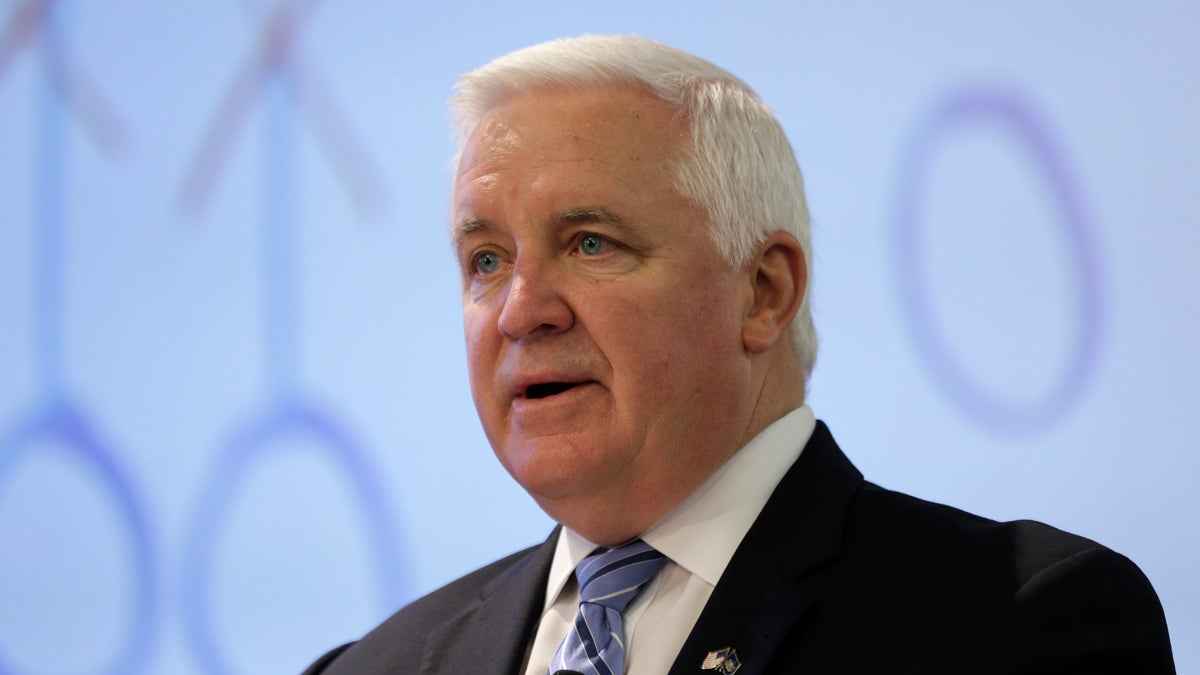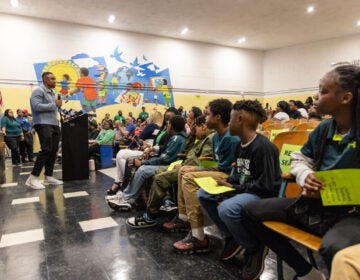Corbett plan finds Philly schools roughly $127M in new funding

Pennsylvania Gov. Tom Corbett speaks during an event discussing impact of sports, hosted by the Rothman Institute, Wednesday, May 22, 2013, in Philadelphia. (AP Photo/Matt Rourke)
Hours before the state budget deadline, Pennsylvania Gov. Tom Corbett announced a plan to help the Philadelphia school district cope with its fiscal crisis. It relies mostly on dollars from the city and from borrowing, while contributing an additional $45 million in one-time state money.
The overall state budget passed the House and Senate, and Corbett signed it Sunday night.
Part of the schools deal still needs legislative approval, and comes with strings attached.
“This budget once again places education as our highest priority, accounting for 41 cents of every state dollar,” Corbett said.
Hours before more than 3,800 district layoffs were scheduled to take effect Monday, Corbett on Sunday outlined a last-minute plan to avoid some of that pain. He said it would raise an additional $140 million for the city schools, compared to $180 million the district asked for from the city and the state.
But one $13-million chunk of Corbett’s $140 million figure is money that was in his original spending plan and already factored into the district’s budget.
It was unclear Sunday how many layoffs or other cuts would be averted under the plan.
Sales tax to hang around
Corbett proposed to let Philadelphia extend its 1 percent sales tax past its scheduled expiration in 2014, and dedicate that revenue for schools. Since that money is already budgeted for use by the city in the new fiscal year, which started July 1, the governor’s plan anticipates that the school district will be able to borrow $50 million against the expected future increase to close its 2013-14 budget gap.
The sales tax extension was approved by the Senate Sunday night, and House leaders said they were on board and would approve it.
Corbett’s plan also would give Philadelphia $45 million from a pot of money that the federal government had wanted to recoup from the state, but has now apparently forgiven. The money stemmed from past Health and Human Services overpayments. The Senate authorized this one-shot infusion of dollars Sunday night, and House leaders also support that, according to a spokesman. They plan to vote on it soon.
The Senate attached conditions to the $45 million and the sales tax extension, requiring that the state Secretary of Education determine that the district has enacted “reforms that will provide for the district’s fiscal stability, education improvement and operational control.”
Philadelphia Senate Democrats, though, did not oppose it.
“Right now, we feel comfortable with it,” said Sen. Vincent Hughes (D-Philadelphia). “Everything we have in place allows for free and fair bargaining.”
Some Philadelphia House Democrats, however, are concerned that the language is anti-union. House GOP leaders said they were for it.
Hunt for back taxes stressed
Corbett’s plan counts on Philadelphia doing a better job of collecting its taxes to raise another $30 million. The legislature is considering several bills to help do that, including one that would allow Philadelphia to put liens on properties in other counties owned by delinquent city taxpayers.
Those bills were not voted on and do not appear to be on the immediate agenda. Mayor Michael Nutter and City Council were projecting the slightly lower figure of $28 million in new revenue from cracking down on tax delinquency.
The final chunk of Corbett’s package comes from an increase in state basic education funding, which for Philadelphia will rise 1.6 percent to $984 million. Again, while Corbett said the increase amounted to $15 million in new dollars, it is only a $2 million increase over Corbett’s February budget proposal, on which the District’s budget is based. Local officials confirmed that the increase was mostly money that the district was already counting on.
The total increase for Philadelphia in state education aid for 2013-14, compared to 2012-13, is about $30 million, if you tack on increased appropriations for special education, transportation, accountability block grants and other funds the district was relying on.
The bitter taste of half a loaf
Philadelphia officials and some education advocates were clearly disappointed that this was the end result after months of lobbying, and the district’s leaders following a playbook of adopting an austerity budget, closing schools, and declaring they had to “live within our means.”
“The plan puts only $45 million of one-time state money into the schools,” said one person close to the talks. “That’s it. The other money is our sales tax and our delinquent tax collection.”
School district officials did not return messages seeking a reaction.
Assuming that the legislature approves the entire package, it would add up to $127 million in additional revenue — $53 million short of what the District said it needed from the city and state to avert a “doomsday” budget that would see schools open with little beyond a minimal number of teachers and a principal.
As district and city officials lobbied frantically over the last several weeks for a deal, Harrisburg was decidedly cool to most ideas. A plan that would have allowed Philadelphia to raise about $45 million this year through a $2 tax on every pack of cigarettes — already passed by City Council — fell off the table at the last minute due to opposition from anti-tax Republicans in the House.
“I think it’s terrible,” said Susan Gobreski of EdVotersPA, which advocates for stable, recurring education funding. “What the state should be doing is enacting a fair funding formula instead of hamstringing districts. They’re going out of their way to avoid providing adequate funding. It’s blatant.”
Democratic lawmakers also said the budget did not include enough state funding for Philly’s schools.
“These are not new dollars in any significant fashion, new recurring dollars, that are coming from the state,” Sen. Hughes said. “That is the big problem in this whole conversation.”
Pennsylvania is one of only a handful of states that does not drive out new school aid according to a predictable formula based on the needs of districts, measuring such factors as tax base, tax effort, poverty rate, enrollment and student needs.
Gobreski said that requiring the district to borrow against the sales tax to plug this year’s $304 million shortfall will incur additional debt service payments. The district borrowed $300 million to make ends meet last year and now spends more than 10 percent of its operating budget, some $280 million, on debt service. Members of the School Reform Commission have said they could not afford any more borrowing.
“That’s money that should go into classrooms,” said Gobreski.
Impact on teachers vague
The contingencies on the money do not specify any changes in the teachers’ contract, particularly in seniority rules, that some education groups had urged as conditions for more funding. On the other hand, the language is vague enough to give the Secretary of Education power to judge what is reform and what isn’t, putting pressure on the negotiations.
The district is seeking $133 million in labor concessions, mostly from the Philadelphia Federation of Teachers, to plug the balance of the $304 million shortfall. The PFT contract expires in August.
This article was reported and written as part of a partnership in covering the Philadelphia schools between WHYY/NewsWorks and the Philadelphia Public School Notebook.
WHYY is your source for fact-based, in-depth journalism and information. As a nonprofit organization, we rely on financial support from readers like you. Please give today.




